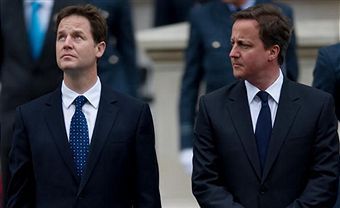 Another day of live political theatre, staged live at College Green. Given that Cameron
last night negotiated a confidence-and-supply deal – ie, enough to keep him in a minority government like Alex Salmond has in Scotland – why is he negotiating further? What’s more to discuss? This
is what we find out today. David Steel told Radio Four this morning that Nick Clegg had told him, before the election, that he would put a time cap on any Con-Lib Pact – ie, a shelf life of one or
two years. This suggests that the Lib Dems would not fall for the obvious Tory ruse: the offer of a referendum on PR due in 2012, but with the sneaky expectation of a new election in May 2011 at
the latest.
Another day of live political theatre, staged live at College Green. Given that Cameron
last night negotiated a confidence-and-supply deal – ie, enough to keep him in a minority government like Alex Salmond has in Scotland – why is he negotiating further? What’s more to discuss? This
is what we find out today. David Steel told Radio Four this morning that Nick Clegg had told him, before the election, that he would put a time cap on any Con-Lib Pact – ie, a shelf life of one or
two years. This suggests that the Lib Dems would not fall for the obvious Tory ruse: the offer of a referendum on PR due in 2012, but with the sneaky expectation of a new election in May 2011 at
the latest.
But Cameron has much more to offer – and things that suit him rather well. He could do with some help in some Cabinet positions: that of Scotland Secretary, for example. There are several policies that Cameron could happily offload. The inheritance tax cut was a popular idea in 2007 – and one which is credited with halting the election-that-never-was – but the policy had become a liability post-crash as it was caricatured as “tax cuts for the richest estates”. Cameron would happily have wished it away, but to abolish it (then) would have looked like a U-Turn. Coalition talks gives him cover to ditch policies he’d want rid of anyway, and recruit Lib Dems to Cabinet jobs that he would find hard to fill. The proposed Bill of Rights, which would be junior to Strasbourg and, ergo, usless, could be axed too.
In private phone calls, Cameron has told Tory MPs that he has to do a deal because Labour is offering the Lib Dems so much. This is not the best sell: the instinct from most Tory MPs is ‘let them – how is a coalition more stable than minority government?’ As Matthew Parris observed on Saturday:
“Mr Cameron must hope that, one way or another, the Lib Dems and Labour do team up to frustrate the result of Thursday’s general election. For the Tories this would be the launch pad to a landslide later on. The summer of 2010 spent kicking their heels in opposition would be a price worth paying by the Conservatives for the decisive victory that they could hope for later.”
This is especially true because Cameron’s generosity has been such that he will come out of this exceptionally well if the Lib Dems walk away from any deal, or if it is vetoed by their membership. Many Lib Dem MPs (like Chris Huhne) rightly fear they can kiss goodbye to those anti-Tory tactical votes if they dance with the blue devil. So it might fall down on the Lib Dem side. Cameron has so far behaved with alacrity and statesmanship – showing the fleetness of foot, stamina and low cunning required of a Prime Minister. The question remaining for the parliamentary party is a simple one: who’s using whom? The Tory MPs meet at 6pm tonight to see if they can find an answer.







Comments